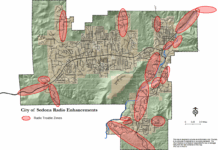Senate Bill 1006 would allow cities to publish municipal notices only on their websites rather than in print newspapers of record.
Larson Newspapers’ Sedona Red Rock News and The Camp Verde Journal are both official newspapers of record, which publish these public records for local governments, nonprofits and businesses. Readers rely on these notices to know what their local governments are doing.
The bill was pre-written before the session by Arizona Sen. John Kavanagh [R-District 3], who has been no friend to public accountability. In 2016, Kavanagh sponsored legislation that would have allowed towns and cities to refuse to fulfill any public records they found “burdensome” — so if you wanted records about how much city staffers were paid for trips or to see all the complaints about a bad cop or a corrupt official, a town could just say “no.”
That same year, Kavanagh wanted to prohibit videotaping police officers in public; when he faced criticism due to the proposal clearly being unconstitutional, he withdrew it. He tried again in 2021, but Republican Attorney General Mark Brnovich said he would never prosecute anyone due to the law’s unconstitutionality. A federal judge agreed and the law was nullified. Kavanagh has floated other bills making it harder for citizens to access public records, obtain government reports and hold officials accountable.
SB1006 is just a bad bill all around. It would allow cities and towns to post public notices on their websites only, allowing them to evade the public scrutiny resulting from those notices being published in newspapers of record, stored in perpetuity at public libraries and online, which anyone can access without requesting an appointment from a town or city clerk.
The false claim that SB1006 would save towns and cities money is a farce. Towns and cities are already required to pay staffers to draft, write, copyedit and format public notices, and then to upload them to the town’s or city’s website. The cost of publishing records in newspapers is negligible. A similar bill proposed in 2012 by Rep. David Stevens [R-District 14] would have cost taxpayers half a million dollars, hundreds of times more than what newspapers statewide charge for the same public service.
Although public records would no longer be available in newspapers of record or public libraries for the public to read at any time, the town or city would still be legally required to have those records at the ready. In practice, a power outage, a computer hacker, a glitchy website update or a disgruntled city staffer could delete the records permanently, leaving towns and cities liable for destroying public records and keeping the public in the dark.
If you are tempted to think, “Certainly no public official would seek to remove public records from the good people of Sedona,” consider this: At a recent Sedona City Council meeting, current Councilwoman Jessica Williamson referred to a figure as “60%” instead of “16%” during a discussion. Our journalist reported what she said verbatim, which matched the city of Sedona’s own video transcription service. Williamson called us for a correction; we were happy to oblige, and printed it in our next edition. The proper move on the part of city staff would have been to correct the video transcript to fix the error. Instead, city staff took down not only the entire video transcript for the meeting, but also all transcripts for all other meetings, stating, “Because of the concern with the transcription being incorrect, rather than putting out something with false information, we decided to take it down while we research other alternatives.”
That was a month ago. So far, no transcription replacement service has been implemented. Due to what is likely the whim of a single Sedona city official, the transcripts are simply gone, denying access to the city’s public records to the hundreds of Sedona residents who are deaf or hard of hearing and rely on those transcripts to know what’s happening in their local government.
These citizens can’t know what’s going on by attending meetings because the city has no sign language interpreter. They are now denied the right to hear from their elected officials — all because of the decision of a single official.
It certainly requires no stretch of the imagination to think that another council member or city staffer in Sedona or anywhere else in Arizona, who might not like certain public records that make them look bad, would take it upon themselves to destroy the aforementioned records if they could.
Quite simply, people do not rely on government websites as a primary source of information. I can’t tell you, dear readers, the number of times a reader has called to complain that the five cities we cover didn’t notify them of a project, development or meeting, the notices for which were buried and went unread somewhere deep within a government website. People don’t scour city websites daily, but they do read newspapers, as you are doing now.
SB1006 has already passed the Arizona Senate by a 16-13 vote and faces discussion in the House. It was amended to only affect Maricopa County, but the legislature has used that gateway tactic before to later target small rural counties like ours. Now is the time to urge our state legislators not to waste time and money duplicating a service that has worked without problems for decades. Now is not the time to make changes to a system that is efficient and cost-effective. If it isn’t broke, don’t fix it.



















